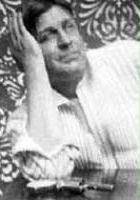April 7, 1902 [Burlesque Suicide no. 2]
Seated in the front row, slouching to let the eyes move upward to the human face on the screen, refraining from scanning the periphery, the result is transformational—first, of the face observed, which grows in almost menacing distortions until it obscures other considerations—including the subject of the picture itself. I find my attention wandering from the situation during such moments, caught up in the face's pantomime, meaningless for a space, but pendent, like an imminent change.
Of course, it is I who enacts the change. Watching the "burlesque suicide," in which the man sits before a table on which rests a pistol, his demeanor tortured, his hands fluttering about the weapon, I knew, of course, I was not to be concerned for him; after all, we had just met, so to speak, and he exists only to finger the gun and look unhappy. No one is asked to care, beyond the supposed suspense of "Will he do it?"
And suddenly the moral implications of the picture loom even larger than the man's face. My unconcern for his fate is actively cultivated by the piece. None of us believe he will do it—but all of us are disappointed that he does not. Oh, we would turn our faces away, and be properly horrified if he did pull the trigger; but that's only a reflection after the fact. The truth of the matter is that our moral sensibilities are being not only suspended but eliminated.
And when he puts down the pistol, points at the camera, and laughs, a final blow falls: In life, such moments occur at the uttermost edge of human experience—the boundary between life and death, sanity and madness. In the moving picture, though, it's at most a study in facial expressions. But I must admit that the faces I hesitate to examine are those of the audience. I will not turn from the faux-suicide to scan their calm (or worse, smiling) mouths, their bright eyes. It's strange enough to hear the small ripple of laughter, not even nervous—accustomed as we all are by now to cinema's potential lack of boundaries—and I do not mean in terms of subject. I suspect that for some time to come certain political or social perspectives will be deemed too radical for Edison and his competitors. No, the boundaries will be aesthetic and experiential, as we grow both to demand more and to expect less of the cinema.
I will admit, though, that his face is fascinating, a monument, to repeat myself, of the human capacity to alter what we see to fit our needs. And, as far as Edison's Projecting Kinetescope is concerned, what we most need is to be entertained, no matter how many bands we must sever.
Of course, it is I who enacts the change. Watching the "burlesque suicide," in which the man sits before a table on which rests a pistol, his demeanor tortured, his hands fluttering about the weapon, I knew, of course, I was not to be concerned for him; after all, we had just met, so to speak, and he exists only to finger the gun and look unhappy. No one is asked to care, beyond the supposed suspense of "Will he do it?"
And suddenly the moral implications of the picture loom even larger than the man's face. My unconcern for his fate is actively cultivated by the piece. None of us believe he will do it—but all of us are disappointed that he does not. Oh, we would turn our faces away, and be properly horrified if he did pull the trigger; but that's only a reflection after the fact. The truth of the matter is that our moral sensibilities are being not only suspended but eliminated.
And when he puts down the pistol, points at the camera, and laughs, a final blow falls: In life, such moments occur at the uttermost edge of human experience—the boundary between life and death, sanity and madness. In the moving picture, though, it's at most a study in facial expressions. But I must admit that the faces I hesitate to examine are those of the audience. I will not turn from the faux-suicide to scan their calm (or worse, smiling) mouths, their bright eyes. It's strange enough to hear the small ripple of laughter, not even nervous—accustomed as we all are by now to cinema's potential lack of boundaries—and I do not mean in terms of subject. I suspect that for some time to come certain political or social perspectives will be deemed too radical for Edison and his competitors. No, the boundaries will be aesthetic and experiential, as we grow both to demand more and to expect less of the cinema.
I will admit, though, that his face is fascinating, a monument, to repeat myself, of the human capacity to alter what we see to fit our needs. And, as far as Edison's Projecting Kinetescope is concerned, what we most need is to be entertained, no matter how many bands we must sever.



Comments
Post a Comment